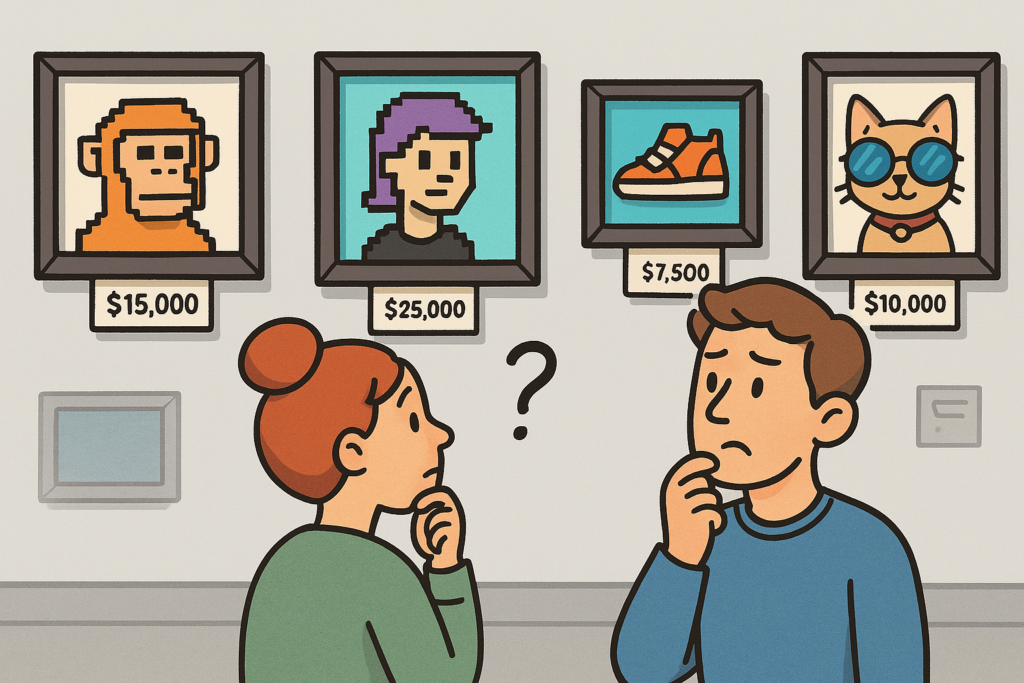NFTs Explained: Worth The Hype?
One day, you’re scrolling through social media, and it seems like everyone is talking about NFTs. People are flipping cartoon apes for six figures, major brands are launching their own digital collectibles, and suddenly, it feels like you’re missing out on the next big thing. But then the headlines shift. Stories emerge of NFT markets crashing, celebrities losing millions, and people questioning whether NFTs were ever valuable in the first place. So what’s the truth? And what are NFTs, anyways?

Are NFTs a legitimate investment opportunity, or were they just a pandemic-era craze fueled by speculation and social media hype?
To answer that, let’s break down what NFTs actually are, why they gained popularity, and whether they have real staying power in the world of digital finance.
What Are NFTs?
If you’ve ever collected baseball cards, rare sneakers, or limited-edition vinyl records, then you already understand the core idea behind NFTs.
An NFT—short for Non-Fungible Token—is a digital asset that proves ownership of something unique. Unlike cryptocurrencies like Bitcoin or Ethereum, where each coin is interchangeable (one Bitcoin is always equal to another Bitcoin), NFTs are one-of-a-kind. They’re stored on the blockchain, which means ownership records can’t be faked, altered, or duplicated.
To put it simply, an NFT acts as a digital certificate of authenticity. You can copy and paste an image all you want, but only one person holds the verified NFT tied to it.
A common comparison is fine art collecting. You can print out a picture of the Mona Lisa, but the actual painting—housed in the Louvre—is worth hundreds of millions because it’s the original. NFTs operate on the same principle, but instead of physical paintings, they exist in digital form.
The Rise of NFTs: From Digital Art to Virtual Real Estate
NFTs started gaining traction in 2021, when artists, celebrities, and crypto enthusiasts flooded the market. Some projects, like CryptoPunks and Bored Ape Yacht Club, turned into status symbols, much like owning a Rolex or a luxury car. People weren’t just buying digital pictures—they were buying exclusivity, membership, and potential future value.
But digital art wasn’t the only use case. NFTs started popping up in music, gaming, and even real estate. Musicians experimented with NFT-based albums that granted exclusive access to live shows. Gamers bought NFT items in play-to-earn games, where digital assets could be traded for real money. Virtual worlds like Decentraland and The Sandbox allowed people to purchase digital land, with some parcels selling for millions of dollars.
It seemed like NFTs were on their way to revolutionizing ownership in the digital space. But then, the market took a turn.
Are NFTs a Good Investment?
When NFTs first exploded, early adopters made massive profits. Some collectors bought NFTs for a few hundred dollars and resold them for tens—sometimes hundreds—of thousands. But as more people jumped in, prices became wildly speculative, and many buyers realized they had no idea what they were actually investing in.
The reality is that not all NFTs hold value. Unlike stocks, which are tied to a company’s performance, or real estate, which generates rental income, most NFTs don’t have inherent worth beyond what someone else is willing to pay for them.
That’s why some investors made life-changing money—while others lost nearly everything.
Take the case of Bored Ape Yacht Club (BAYC). At its peak, owning a Bored Ape was like having a VIP pass to an exclusive club. Celebrities like Eminem, Steph Curry, and Paris Hilton bought in, driving demand higher. But once the hype cooled down, values plummeted. An NFT that sold for $400,000 in early 2022 could now be worth just $50,000 or less.
So are NFTs a good investment? It depends on why you’re buying. If you’re looking for quick flips, the market is extremely volatile. But if you believe in the long-term potential of digital ownership, certain NFT projects may still hold value over time.
The Risk of NFT Scams & Market Manipulation
NFTs might sound exciting, but they also attracted a wave of scams and bad actors. Many projects promised exclusive benefits, skyrocketing value, and guaranteed profits—only to vanish overnight.
One of the biggest scams is the rug pull, where developers create hype around an NFT collection, sell out the tokens, then disappear with investors’ money. Another problem is wash trading, where buyers and sellers manipulate prices by selling NFTs back and forth to make them seem more valuable than they actually are.
Even legitimate NFT marketplaces have been targets of hackers and phishing attacks. Since NFTs exist on the blockchain, there’s no customer support or refund policy if you lose access to your wallet. For anyone considering NFTs, doing research is essential. Avoid projects without clear utility, anonymous founders, or unrealistic promises of returns.
The Future of NFTs: Fad or Financial Revolution?
Even though the speculative bubble around NFTs has burst, the technology itself still has potential beyond overpriced JPEGs.
Many industries are adopting NFT technology in ways that actually make sense.
Some real-world examples include:
- Digital Identity & Contracts – NFTs could serve as ownership records for everything from real estate to luxury goods.
- NFT-Based Ticketing – Sports teams and concert venues are experimenting with NFTs as tamper-proof event tickets.
- Gaming & Virtual Economies – Instead of buying in-game items you can’t trade, NFTs allow players to truly own and resell digital assets.
The difference between hype-driven NFTs and real utility NFTs comes down to long-term usefulness. If NFTs evolve beyond speculation and into practical applications, they may become a lasting part of the digital economy.
Conclusion: Should You Buy NFTs?
If you’re thinking about buying an NFT, the first question you should ask is:
Am I buying this as an investment, or just for fun?
If you genuinely enjoy the digital art, community, or perks that come with owning an NFT, there’s no harm in collecting. But if you’re hoping for a financial return, you have to understand the risks of extreme volatility and market manipulation.
NFTs have already proven they aren’t just a passing trend, but whether they’ll evolve into a legitimate investment category is still up for debate. As always, never invest more than you’re willing to lose—especially in an industry that’s still figuring itself out.
